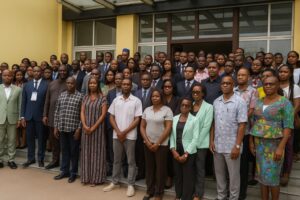Historic Pass Rates in Brazzaville
A wave of celebration swept through Congo-Brazzaville this week after exam officials confirmed unprecedented results for the June 2025 technical and vocational session. The Brevet de technicien forestier, or Btf, wp-signup.phped a flawless 100-per-cent pass rate, an outcome rarely witnessed nationwide.
All 59 forestry candidates who assembled in Brazzaville for the practical and written assessments were declared successful during the 27 August deliberations. Their collective achievement set the tone for a broader improvement across other certificates, underscoring a year in which statistics overtook even optimistic ministry forecasts.
At the mid-level Brevet d’études techniques, known as Bet, 5,308 out of 6,841 candidates crossed the line, producing a sturdy 77.59 percent pass rate. Meanwhile the Brevet d’études professionnelles, or Bep, recorded 315 successes from 424 entries, translating into 74.29 percent.
Combined, the three certificates give Congo its most convincing technical examination profile in recent memory. Although Bet and Bep trails the flawless forestry score, the upward curves—compared with 2024’s rates that hovered below 70 percent—signal that classroom reforms and targeted investments are beginning to convert policy into measurable outcomes.
Policy Measures Driving Classroom Change
Officials attribute the surge partly to the government’s multiyear plan to modernise technical institutes. Under the scheme, workshops received updated machinery, rural schools were connected to power, and continuous training sessions familiarised teachers with competency-based approaches designed to make curricula more responsive to regional labour needs.
Speaking during the announcement, jury president Rufin Mviri said the outcome ‘reflects the hard work of learners and instructors alike.’ He emphasised that strict monitoring, earlier distribution of teaching materials and the timely payment of examination fees by the state eliminated distractions that had previously eroded candidate confidence.
Education economist Aimée Loubaki notes that a 100-percent pass rate is statistically rare but believes the forestry figure is credible, given the small cohort and the sector’s longstanding culture of mentorship. ‘The data match field observations of better supervision and attendance,’ she told local radio.
Teachers and Students Speak Up
For instructor Pascal Makaya, who teaches mechanical drawing at Lycée Technique 1-Mai, the secret lay in weekly mock tests. ‘We simulated examination conditions from January,’ he explained. ‘By August, students could regulate stress and manage time with the precision of seasoned technicians.’
Candidate Clarisse Ngani, newly certified in electrical maintenance, described a collective spirit. ‘We formed peer groups and filmed practical exercises on our phones. Reviewing those clips after class exposed errors we never noticed on paper,’ she said, praising trainers for granting extended workshop hours before the practical exams.
Teachers equally benefited. Ministry-sponsored digital tablets allowed staff to download updated guidebooks instead of waiting for printed deliveries. According to metallurgy tutor José Mavoungou, the devices cut lesson-planning time in half and enabled real-time sharing of schematics during laboratory sessions, boosting learner engagement.
Linking Skills to National Development
Congo’s economic planners view technical education as a cornerstone of diversification. While oil remains dominant, forestry, agriculture and light manufacturing increasingly require middle-level technicians who can maintain equipment locally. Stronger exam outcomes are therefore interpreted as evidence that the talent pipeline for emerging industries is widening.
The flawless Btf showing is especially meaningful for sustainable forestry management programmes promoted under Vision 2025. Graduates are expected to fill roles in community logging cooperatives and replanting projects aimed at balancing timber revenues with biodiversity protection along the dense equatorial belt that bisects the republic.
Business associations already report heightened interest in technical school alumni. Jean-Marc Ebina, secretary of the Brazzaville Metalworkers Union, said firms prefer candidates who possess both a recognised certificate and recent exposure to modern tools. ‘For recruiters, the 2025 cohort signals reduced onboarding costs and faster deployment on site.’
International organisations have taken note. UNESCO’s regional office praised Congo for aligning curricula with Continental Education Strategy for Africa benchmarks, remarking that ‘consistent evaluation gains across multiple certificates illustrate scalable practice.’ Analysts suggest such endorsements could unlock technical assistance grants for further laboratory upgrades.
Looking Ahead to the 2026 Session
Despite the celebration, authorities acknowledge lingering gaps. Rural enrolment in specialised streams remains uneven, and female participation in heavy-industry options is still below 25 percent. The ministry plans targeted outreach campaigns and scholarships to persuade more girls and remote learners to sit the 2026 examinations.
Another priority involves deepening partnerships with local enterprises so that syllabuses stay relevant. A pilot dual-training system, whereby students alternate weeks between school and factory, is on the table. Officials believe such exposure will sharpen soft skills and further raise pass rates without compromising academic rigour.
For now, the 2025 statistics stand as a morale booster across campuses. As students pin their fresh certificates on noticeboards and parents applaud, policymakers argue that the numbers confirm a positive trend. If sustained, the momentum could redefine perceptions of technical careers among Congo’s ambitious youth.






















